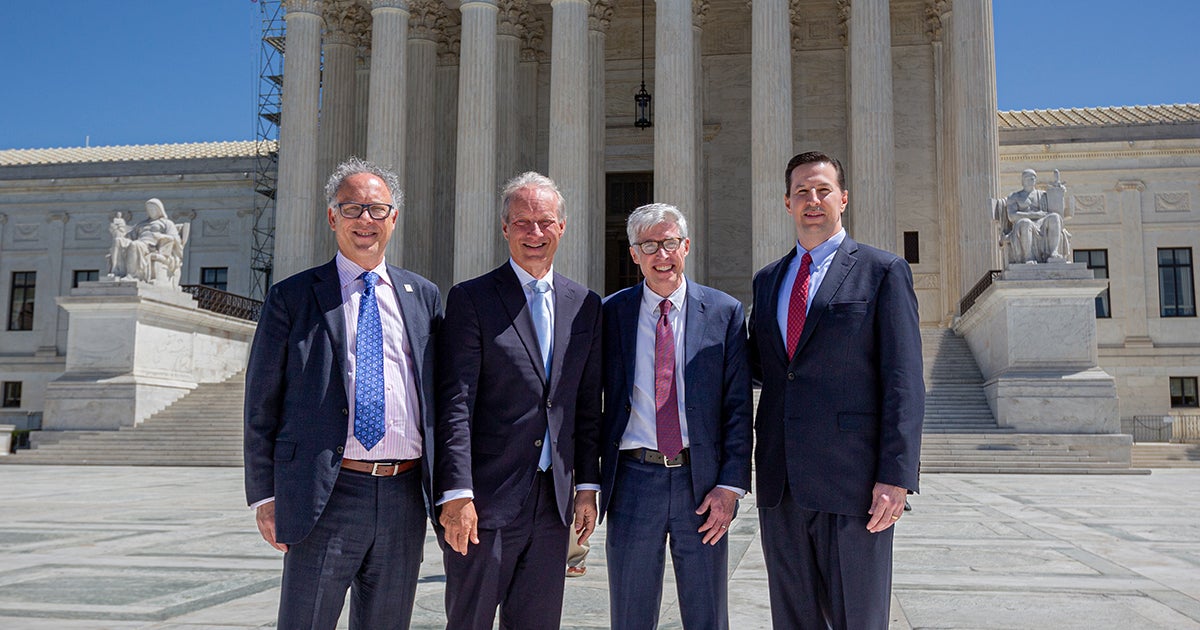
by Jorge Gomez • 7 min read
First Liberty argued at the U.S. Supreme Court this week on behalf of faithful carrier Gerald Groff.
Led by our volunteer attorney Aaron Streett of the law firm Baker Botts, we made the case to the nation’s highest court that Americans should not be forced to choose between their faith and their job.
We argued that the Court should reverse a lower court ruling that held the postal service is not required to grant a religious accommodation for an employee to observe the Lord’s Day.
Much of this case centers around how to interpret and apply Title VII of the 1964 Civil Rights Act. The statute prohibits, among other things, discrimination in the workplace on the basis of religion. We’re asking the Court to reexamine a case from the 1970s (TWA v. Hardison) that interpreted an Equal Employment and Opportunity Commission guidance document in a way that minimized protections for religious practices at work. That ruling has since been applied by courts across the nation to Title VII, watering down the protections that Congress provided for religious employees and tipping the balance in favor of corporations and the government over the rights of employees.
In case you missed it, watch this special First Liberty Live! episode with our attorneys at the steps of the Supreme Court just moments before going in the courtroom. You can also listen the full audio of the argument.
Here’s a recap of what happened in the courtroom.
In his opening statement, Streett argued that Gerald was unlawfully punished because of his religious conviction that he observe the Lord’s Day. Streett emphasized that courts have interpreted Title VII so restrictively that employers need not grant even the simplest of accommodations to religious observers to enable them to follow their faith. He urged the court to reverse Hardison and the “de minimis cost” standard, which, he argued, gave employers greater power to deny religious accommodations by citing trivial business inconveniences.
Streett also pointed out that under the current legal standard, religious employees are treated unequally. They are not granted equal consideration or accommodated as employees who are legally protected for other reasons. “There’s no reason religious workers should receive lesser protection than those covered by other accommodation statutes,” he added.
He advocated for a legal standard that would require employers to prove that workers’ religious accommodations would impose a “significant difficulty or expense” to their businesses in order to deny them.
Streett’s closing made clear: “This Court should reject the government’s watered-down test for undue hardship. It will provide inadequate protection for religious liberty in the workplace, and it will even gut Sabbath accommodations.”
Several justices—including Justices Samuel Alito, Neil Gorsuch and Clarence Thomas—were sympathetic to our legal team’s arguments. They appeared willing to revisit Hardison, suggesting the current standard is disproportionately preferential to employers.
Justice Neil Gorsuch said the “de minimis cost” test was too expansive to be the only standard. He suggested there might be “common ground” to help clarify that the court’s standard was meant to be higher than just a trivial or inconvenient cost to the employer. “Maybe, we could do a good day’s work and put a period at the end of it by saying that is not the law,” he added.
Justice Amy Coney Barrett was receptive to that argument and floated the idea of sending the case back to the lower courts with clear instructions: “to be clear, de minimis doesn’t mean trifling costs.”
Justice Alito pointed to multiple filings from minority religious groups, including Muslims, Orthodox Jews, Hindus and Seventh Day Adventists, who’ve said the current “de minimis” test violated “their right to religious liberty.”
U.S. Solicitor General Elizabeth Prelogar argued for the post office. She said changing the standard of “undue hardship” was a policy question for Congress, not the Supreme Court, to decide. She asked the Court to not overturn Hardison and asserted that creating a new standard could upend the status quo for employees and employers.
“The thing I’m trying to avoid is this idea that the court would just throw it all up for grabs and say, ‘we have to do this over under some new standard,’” she told the Court.
It’s worth noting that the Solicitor General appeared to agree with part of the arguments made by our legal team. Prelogar said the “de minimis cost” test should be used with proper context in mind and that the government would welcome a clarification from the Court in that respect.
Justices Ketanji Brown Jackson, Elena Kagan and Sonia Sotomayor seemed sympathetic to the post office. They appeared skeptical of revisiting the Court’s ruling in Hardison. They suggested that it’s up to the legislative process to remedy the “undue hardship” standard.
“For decades, this has been the rule,” Justice Kagan said. “Congress has had that opportunity to change it. Congress has not done so.” Justice Jackson echoed this, saying: “Hardison has been on Congress’s radar screen for a very long time, and they’ve never changed it.”
As Streett noted, however, Congress already set a standard to protect religious employees, and the Court should fix the damage it has done to Congress’ law, instead of attempting to divine why Congress has not revised the law that already provides strong protections for people of faith.
Want to dive deeper? President Kelly Shackelford, along with attorneys Aaron Streett, Alan Reinach and Randy Wenger give you a post-argument break down:
We want to thank YOU for standing strong alongside Gerald and First Liberty. Taking important cases like this to the Supreme Court is only possible because of your generous support.
Please continue praying for Gerald, our legal team and the Supreme Court justices while we wait for a decision. There’s a lot at stake with the Faithful Carrier case. The legal issues could not only impact Gerald, but also every religious person and their legal protections in the workplace.